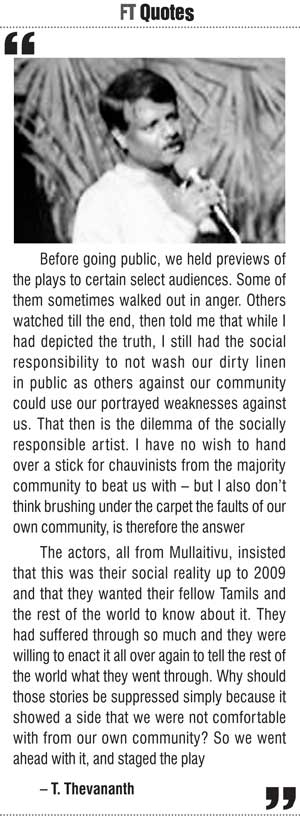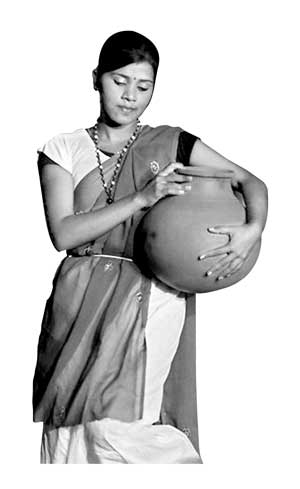Friday Feb 27, 2026
Friday Feb 27, 2026
Saturday, 10 September 2016 00:02 - - {{hitsCtrl.values.hits}}
By Thulasi Muttulingam
With the recent Nallur Festival that came to an end, concluded also a festival of theatre for theatre-goers in Jaffna. Held nightly to coincide with the Nallur festival for some years now, the plays, put on by the Active Theatre Movement in Jaffna seek to revive the habit of drama and theatre-watching in the peninsula. 
“Four years ago, when we began this effort, we held the plays by the road top on Pointpedro Road so that street (temple)-goers could easily see us and thus be attracted,” says T. Thevananth (46), the Director and Founder of the Active Theatre Movement theatre group.
“By 2014, we shifted to our current premises in the bystreet of Paanankulam, Nallur Cross Road and managed to get the word out to people through word of mouth. In 2015, we had full crowds attending our venues and this year, people are already asking when we will be hosting our plays again. We have seen a definite improvement in theatre attendance and appreciation over the years therefore. Soon hopefully, will come a time when people will willingly pay to watch our performances. Right now, we still stage them free of charge to the public.”
On par with anything the Lionel Wendt and other theatre venues in Colombo have to offer – indeed, perhaps even superior given the range and depth of social issues explored with just the right touches of finesse, humour and poignancy – it is rather a pity to see such theatre groups struggling for funds and patronage in the north.
“Local businesses do not have the culture of supporting us here,” says Thevananth. “NGOs sometimes hire us for trainings and workshops to help empower people with creativity and personality development – we utilise those funds to stage our free plays at Nallur. All of us have day jobs and are relegated to treating this as a hobby, even though it’s a passion that rules us.”
Thevananth himself is Director at the Media Resource and Training Centre (MRTC) in Jaffna which trains future journalists. Most of his co-theatre activists are similarly engaged and employed, yet they have been putting in the time from January onwards, to script, rehearse and produce these plays, free of charge to the public, in August.
The plays staged nightly, ranged from cultural and traditional to modern and innovative. There were children’s plays as well as plays for adults; plays depicting humour as well as tragedy; they ran the whole gamut during the festival. Their sole distinguishing feature was their social relevance.
Social realities are not always pleasant. To depict it to the people in the midst of whom it is happening, in a manner that is not too much of a bitter pill to swallow, is the art that is socially relevant theatre. It is an art form that Thevananth and his team are still struggling to perfect.
“I personally write most of the plays we stage,” says Thevananth. “Before going public, we held previews of the plays to certain select audiences. Some of them sometimes walked out in anger. Others watched till the end, then told me that while I had depicted the truth, I still had the social responsibility to not wash our dirty linen in public as others against our community could use our portrayed weaknesses against us. That then is the dilemma of the socially responsible artist. I have no wish to hand over a stick for chauvinists from the majority community to beat us with – but I also don’t think brushing under the carpet the faults of our own community, is therefore the answer.” 
In the end, he decided to tone down some of the excesses he had originally portrayed but still portrayed the social realities as they exist (or once existed). How much the conspiracy of silence had hurt the understanding of our own recent history could be seen by the audience’s puzzlement over one of the most tragic plays, enacted by a theatre group from Mullaitivu; that of the death and destruction they had undergone during the last stages of the war.
Every single member of this group had personally undergone this ordeal all the way up to Mulliwaikal in 2009. Jaffna however, under Government control since 1995 had escaped the horrors of this last war and thus many of the younger residents had little clue as to what they were seeing. This was the play that saw older residents at the preview walk out – because it showed forcible conscription and harassment of the people on one side while they were at the same time being bombed and killed on the other side.
“We are used to operating in social contexts where it was always dangerous to name the perpetrators. So we got used to portraying social realities and let the audience make of them what they would. That is what we still do – but then in some cases, the perpetrators are obvious. When some of the Jaffna residents reacted so angrily to our Mullaitivu play preview, I asked my team if we should scrap the play. But then the actors, all from Mullaitivu, all of whom had taken the trouble to learn drama and acting to put on this play for nearly a year, insisted that this was their social reality up to 2009 and that they wanted their fellow Tamils and the rest of the world to know about it. They had suffered through so much and they were willing to enact it all over again to tell the rest of the world what they went through. Why should those stories be suppressed simply because it showed a side that we were not comfortable with from our own community? So we went ahead with it, and staged the play.”
Apart from this tragic play that was extremely poignant, there were also plays in a lighter vein which nevertheless explored everything from teenage angst over oppressive parents, to elders’ loneliness after their children migrate abroad. This year, there were also music and dance from South India, as an artiste from Tamil Nadu, dance master Venu arrived in time to teach the troupe some south Indian folk arts. There were Sinhala traditional dances and music too. A final year student at the Faculty of Management in Jaffna University, Vidura Perera had volunteered to teach the younger troupe members some aspects of Sinhala traditional dance and song.
It was heartening to see this variety and diversity of performances portrayed on the stage in Nallur, Jaffna this year. There were performances by upcountry Tamil artists as well. All in all the festival was well received.
Though some people walked out of his previews according to Thevananth, none did at the actual performances themselves. Indeed over the days, the crowds became so packed that in the last days, people ran out of seats and had to stand. We already can’t wait for the next festival.
Thevananth and his team are considering re-staging some of their work in Colombo. Don’t miss the opportunity to view them if they come to town. If you want a quick understanding of the social issues pervading the lives of the Tamil community in the country, they are the people to watch.